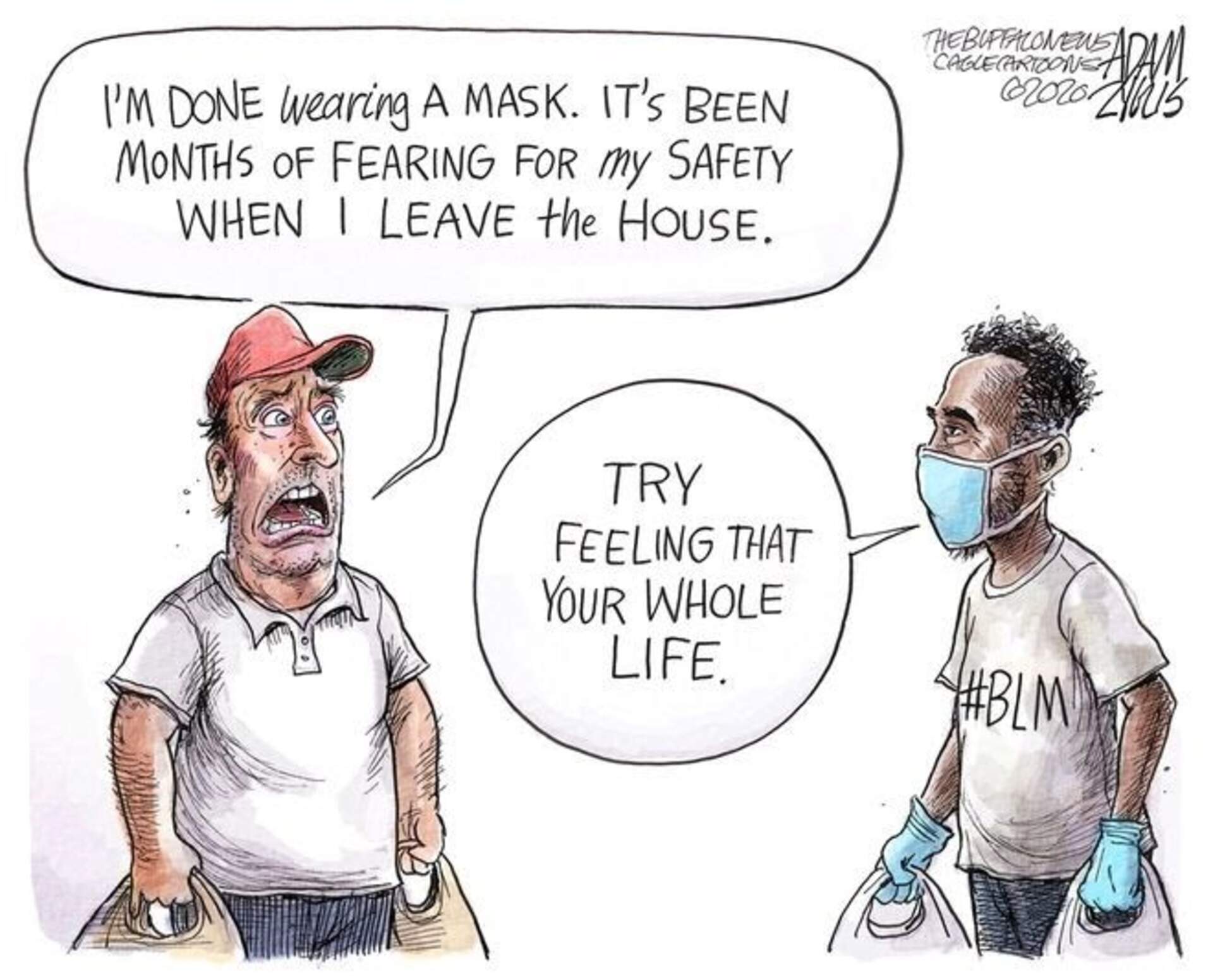
Adam Zyglis (b. 1983), White Privilege, 2020; published June 4, 2020 for the Buffalo News
History Repeats, Until One Day It Doesn't: Reflections on Past and Present by Tiffany Gaines
Monday, Jun 8, 2020
We often hear the phrase “history repeats itself.” We bear witness to cyclical moments, when connections are made between past and present in our lives, or as what I like to call them, full circle moments. The violent cycles of police brutality, oppression and racism prevalent in America are currently the subject of protests across the country and around the world. Black Americans are tired of this painful history repeating itself, and rightfully so. The outrage surrounding the recent murders of George Floyd, Breonna Taylor and Ahmaud Arbery, among so many others, is not new. These protests are not just about one person, one bad cop or one video. The continued display of disregard for the lives of Black men and women, the disproportionate impact of the COVID-19 pandemic on communities of color, and the government systems that have unfairly targeted and oppressed Black communities for generations have all become too much of a load to bear. Enough is enough.
We are all witnessing this historical moment, and it is crucial for each of us to reflect on the role we are meant to play in the ongoing fight for change. Artists in particular have a special gift for documenting history, synthesizing and expressing the realities and the many emotions stemming from this experience. Their work will serve as a reminder of this moment in history forever. Legendary singer-songwriter and activist Nina Simone once said in an interview, “It is the artist’s duty to reflect the times in which we live.” The Center will be presenting its June M&T Second Friday LIVE this week, and while it feels strange to carry on as “normal” right now, this month’s lineup includes two particularly poignant artists who carry out this duty, while also exploring the cycles in history that bring us back to this moment.
Pulitzer Prize-winning editorial cartoonist Adam Zyglis uses his platform to speak truth to power, calling out the politics, systems and people that perpetuate injustice. While all of his cartoons offer a sobering reality, a recent cartoon aptly titled White Privilege, pictured above, makes a statement about the collective weariness the Black community feels from wearing a mask, from feeling unsafe on the street, while they take a jog, and while they sleep in their homes.
In collaboration with the Burchfield Penney, artist and webcomic Caitlin Cass celebrates the 100th anniversary of the 19th amendment in her Women’s Work: Suffrage Movements 1848-1965 series. Interweaving time periods, activists and monumental figures from suffrage movements throughout history, the comic series offers a historical complement to Zyglis. It reminds us that protest, civil unrest and demands for change are nothing new. However, the series also recounts lesser known stories of the movement, exploring some of the moral corners cut and the discard of Black voices for the progression of one group’s interests over another. Comic Number 5 speaks directly to this, retelling the demise of the American Equal Rights Association and the intentional condemnation of African Americans' right to vote to maintain progress towards women’s suffrage.
Zyglis cites the journalistic adage, “Comfort the afflicted and afflict the comfortable,” as a mantra that informs his work. Now is the moment when the comfortable must be afflicted with the reality of how this country has treated and continues to treat Black people, and art has a profound power to do this. It is not the Black community’s responsibility to fix the systems designed without regard for our humanity in the first place. White silence only will continue to perpetuate violence.
In his April 1963 letter from Birmingham Jail, Dr. Martin Luther King Jr. wrote that the greatest stumbling block will be “...the white moderate, who is more devoted to ‘order’ than to justice; who prefers a negative peace which is the absence of tension to a positive peace which is the presence of justice; who constantly says: ‘I agree with you in the goal you seek, but I cannot agree with your methods of direct action’; who paternalistically believes he can set the timetable for another man's freedom; who lives by a mythical concept of time and who constantly advises the Negro to wait for a ‘more convenient season.’ Shallow understanding from people of good will is more frustrating than absolute misunderstanding from people of ill will. Lukewarm acceptance is much more bewildering than outright rejection.”
Without the acknowledgement and understanding of this point, history will only continue to repeat. My hope is that artists and institutions will be encouraged even more to speak truth to the past and the present so that we can begin to envision a better future. All lives cannot matter until the comfortable stand up and recognize that Black Lives Matter.
-Tiffany Gaines, Curatorial and Digital Content Associate